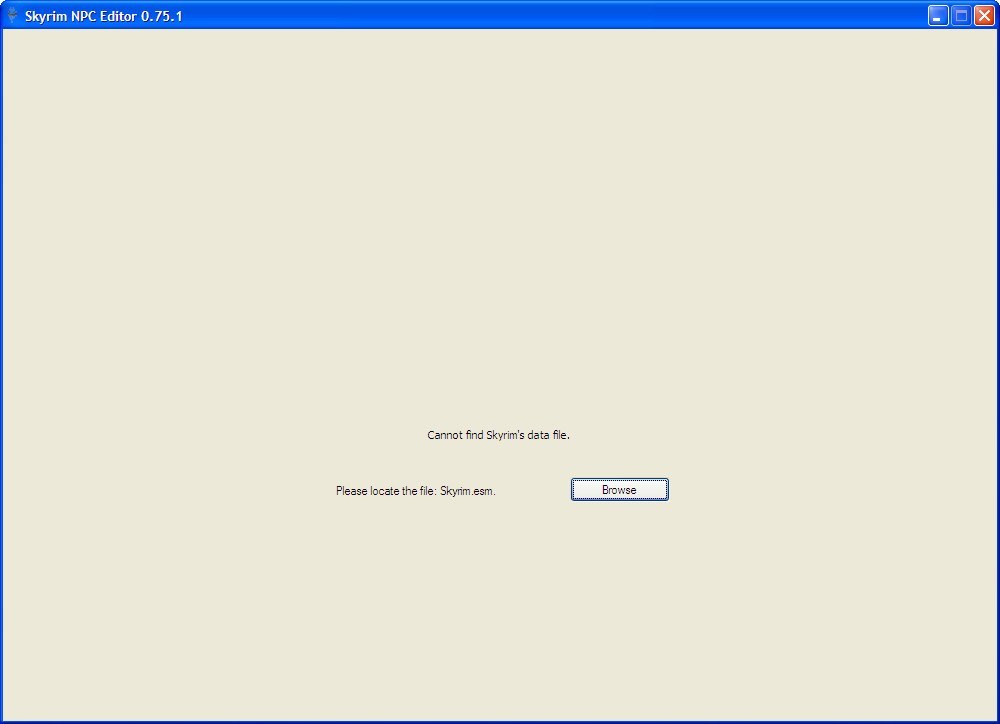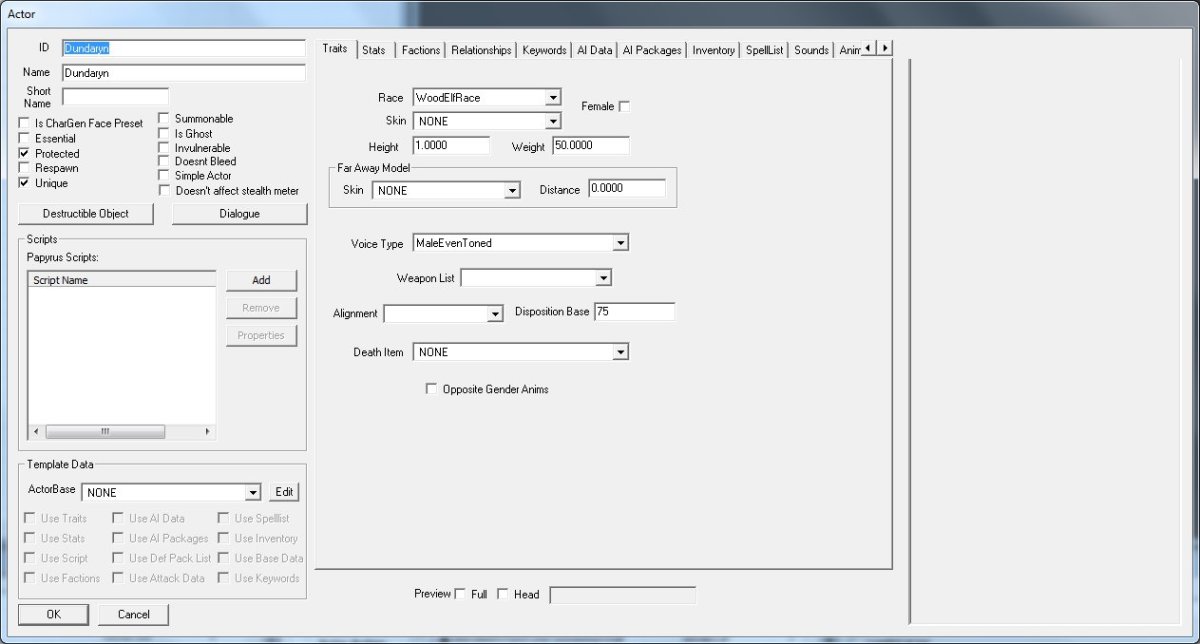Release edit edit source. In a statement made on the Bethesda forums, the Creation Kit was supposed to be released alongside the v1.4 patch.A post made on January 27th, 2012 stated that Bethesda anticipated the release of the patch to be 'next week,' with the Creation Kit not far behind. However, the kit was scheduled for release on February 7th, 2012 as stated by Pete Hines, one of the. NPC (Non-Player Character) is a generic term for all humanoids (of various races), other than you, that are encountered while playing Skyrim. The difference between NPCs and other creatures is somewhat blurry in Skyrim. Some Skyrim NPC Editor users have experienced a problem where, after selecting a replacement head when creating their new NPC mod, gaps appear in-game between the newly modified NPC's body and neck. This is not necessarily always visible if an NPC is wearing garments/equipment/etc. Which hides the neck & collarbone area from view, but can be.
NPC (Non-Player Character) is a generic term for all humanoids (of various races), other than you, that are encountered while playing Skyrim.
- This page lists all characters in The Elder Scrolls V: Skyrim. 1 Instructions 2 Information 2.1 Base ID 2.1.1 Finding base IDs in-game 2.2 Reference ID 2.2.1 Finding reference IDs in-game 3 Data Table To place a new copy of an NPC at your current location, type the following in the console: player.placeatme To move to an NPC, type the following in the console: player.moveto.
- Creating Custom Bodies for Individual NPCs/Followers - posted in Skyrim Special Edition Mod Talk: Hello! Im trying to create custom bodies (in Bodyslide) and then assign them to specific NPCs in the game (Lydia, Jordis, etc). I want certain NPCs to have completely different body shapes and body textures from the other NPCs in the game - and bodies that are completely distinct from one another.
The difference between NPCs and other creatures is somewhat blurry in Skyrim. One key difference is in trapping their souls: NPC souls cannot be trapped into ordinary Soul Gems; only Black Soul Gems or Azura's Star (Black) can be used.
Classes are still used by NPCs, despite being inaccessible to you.
- 4NPC Statistics
Named NPCs[edit]
There are many named NPCs in Skyrim. These people are all listed on the People page. All quest-givers, trainers, and merchants in the game, as well most of the people in cities and towns are named characters.
Some named characters are deemed to be Essential ('unkillable'). If these characters are attacked, they will fall to their knees and surrender when they near zero Health. After a few minutes, they will rise up with full health, and will reengage their enemies until the latter parties are dead or out of the area. Protected characters, on the other hand, can be attacked and killed by you but not by NPCs (however, a bug means that poisons can kill even Protected characters). Most NPCs can be killed, but there may be consequences later.
Special categories include:
Generic NPCs[edit]
There are also many generic NPCs in the game, most of which are randomly generated. If one dies for whatever reason, the game will eventually generate a new random replacement.
Friendly NPCs include:
- MadmenDB
- MinersDB
- Redoran guardsDB
Enemy NPCs include:
Skyrim Change Npc Face
- CultistsDB
- Haknir's crewDB
- Mogrul's thugsDB
- Morag Tong assassinsDB
- PiratesDB
- ReaversDB
- WerebearsDB
- WerewolvesDG
Various other humanoid enemies (e.g., falmer, dragon priests, hagravens) are not NPCs, meaning they do not have black souls.
Console IDs[edit]
All characters in the game have two distinct FormIDs that can be used in conjunction with console commands: a BaseID and a RefID. Most console commands will accept only one of the two types of IDs: the BaseID is generally used in cases where you want to spawn a new copy of an object, whereas the RefID is generally used in cases where you want to interact with an existing copy of an object. The BaseID points or refers to the immutable prototype or template of an object; the RefID points or refers to the actual in-game working copy of the object.
Although this RefID/BaseID distinction exists for all objects in the game, it is particularly important for all of the game's unique NPCs. Most of the game scripts use RefIDs (via the associated EditorID) to control unique NPCs. This means that if you use the placeatme <BaseID> command to spawn a new copy (with a new RefID) of, for example, Esbern, the new copy of Esbern will be ignored by most of the quest scripts. Your clone may have the correct dialogues and appearance, but many quest updates triggered by Esbern will not be triggered by your clone.
Therefore, when using the console with unique NPCs you should always avoid the placeatme command. All of this site's NPC pages provide the NPC's RefID, as long as the ID is not randomly generated, which should be used to locate or modify the existing copy of the NPC. For example, to move a missing NPC to your location, use:
prid <RefId>moveto player

If the NPC is not visible after those commands, then the character may have been disabled, so type:
Or if the character is dead:
resurrect 1
If you would prefer to move your character to the location of an NPC (instead of vice versa), you can instead use the command:
player.moveto <RefId>
NPC Statistics[edit]
The behavior of an NPC is controlled by a variety of NPC-specific statistics.
Aggression[edit]
There are four possible values for aggression. Together with the faction relationship combat modifier this governs whether the NPC initiates combat [1].
Skyrim Npc Editor Xbox One
- 0: Unaggressive. Attacks nobody unless provoked.
- 1: Aggressive. Attacks enemies on sight.
- 2: Very Aggressive. Attacks enemies and neutral on sight.
- 3: Frenzied. Attacks anybody on sight.
Assistance[edit]
Assistance determines whether an NPC will help in combat.
Skyrim Npc Editor Unhandled Exception
- 0: Will not help anyone.
- 1: Will only help Allies.
- 2: Will help Friends and Allies.
Confidence[edit]
There are five possible values for confidence:
- 0: Cowardly. Always flees from battle at low health
- 1: Cautious. Attacks only lower level enemies.
- 2: Average. Avoids higher level creatures.
- 3: Brave. Attacks unless being outmatched by the opponent.
- 4: Foolhardy. Attacks any type of enemy and fights to the death.
Morality[edit]
Morality determines whether or not an NPC will commit various crimes, and controls whether or not a follower will agree to do certain requested actions. There are four possible values for morality:
- 0: Any Crime. NPC is willing to commit any requested crime.
- 1: Violence Against Enemies. NPC is willing to commit violence against enemies, as well as property crimes. NPC is not willing to attack innocent people.
- 2: Property Crime Only. The only crimes the NPC will commit are property crimes (i.e., theft).
- 3: No Crime. NPC is not willing to commit any crimes. Followers with this morality will still not report crimes that they witness you committing (with the exception of crimes against them, such as stealing items owned by the follower).
Notes[edit]
- If you complete one or more of an NPC's quests, they will often greet you by saying 'You've been a good friend to me. That means something.' or another similar phrase indicating their affection. This conveys certain benefits, such as allowing you to take some low value items from their dwelling, or making some NPCs available to become a follower or spouse.

See Also[edit]
- Generic Dialogue — A list of dialogue that is not unique to a particular NPC.
- Unused NPCs — A list of all NPCs that were not implemented in the final game.
Over 80 new NPCs have been added by the Dawnguard add-on, including six followers, five trainers, and also three ferrymen who can be hired to take you between certain cities by boat. Many of the new NPCs are aligned with either the Dawnguard or the Volkihar vampire clan, but some do not have a 'side'. Certain NPCs can be found in their main location immediately after installing the add-on, while others can only be encountered during certain quests.
Key Players[edit]
There are a few NPCs who play a major role in the adventures you embark on during the add-on's main questline. You will encounter them throughout the storyline regardless of your choices in gameplay.
- Isran — Leader of the Dawnguard vampire hunters. Wishes to wipe out the vampire menace in Skyrim.
- Lord Harkon — Leader of the Volkihar vampire clan. Plans to use Elder Scrolls in a ritual to blot out the sun.
- Serana — The daughter of Lord Harkon. She is sought by Harkon for use as a sacrifice in his ritual.
- Dexion Evicus — A moth priest who reads an Elder Scroll for whichever faction you ally yourself with.
- Valerica — The estranged wife of Harkon and mother of Serana. She is trying to protect her daughter and keep Harkon from succeeding in his plan.
- Knight-Paladin Gelebor — A Snow Elf who guards the wayshrine at the Chantry of Auriel. He will offer you Auriel's Bow in exchange for a favor.
- Arch-Curate Vyrthur — The brother of Knight-Paladin Gelebor. He is responsible for creating the prophecy Harkon wishes to fulfill.
Static NPCs[edit]
This table lists all static NPCs added by the Dawnguard add-on, sorted by their locations. The table does not include generic NPCs whose locations and actions are both radiant and dependent on quests (e.g., Visiting Advisor). For a category listing of all NPCs added by the Dawnguard add-on sorted alphabetically, see this page. The 'key players' listed above are also included in this table.
|
|
|
|

Other NPCs[edit]
This is a list of NPCs not included in the above table, for reasons given below.
- These NPCs only appear during radiant side quests:
- These NPCs are added to regular leveled lists for enemies:
- These NPCs are encountered as enemies if you are allied with the opposite faction:
Notes[edit]
- With the Dawnguard add-on, you will encounter Snow Elves for the first time, and learn some of their history.
- Game data for the NPCs Dawnguard Hunter, Rogen, and Thaer was added by the add-on, but they do not appear in-game.
